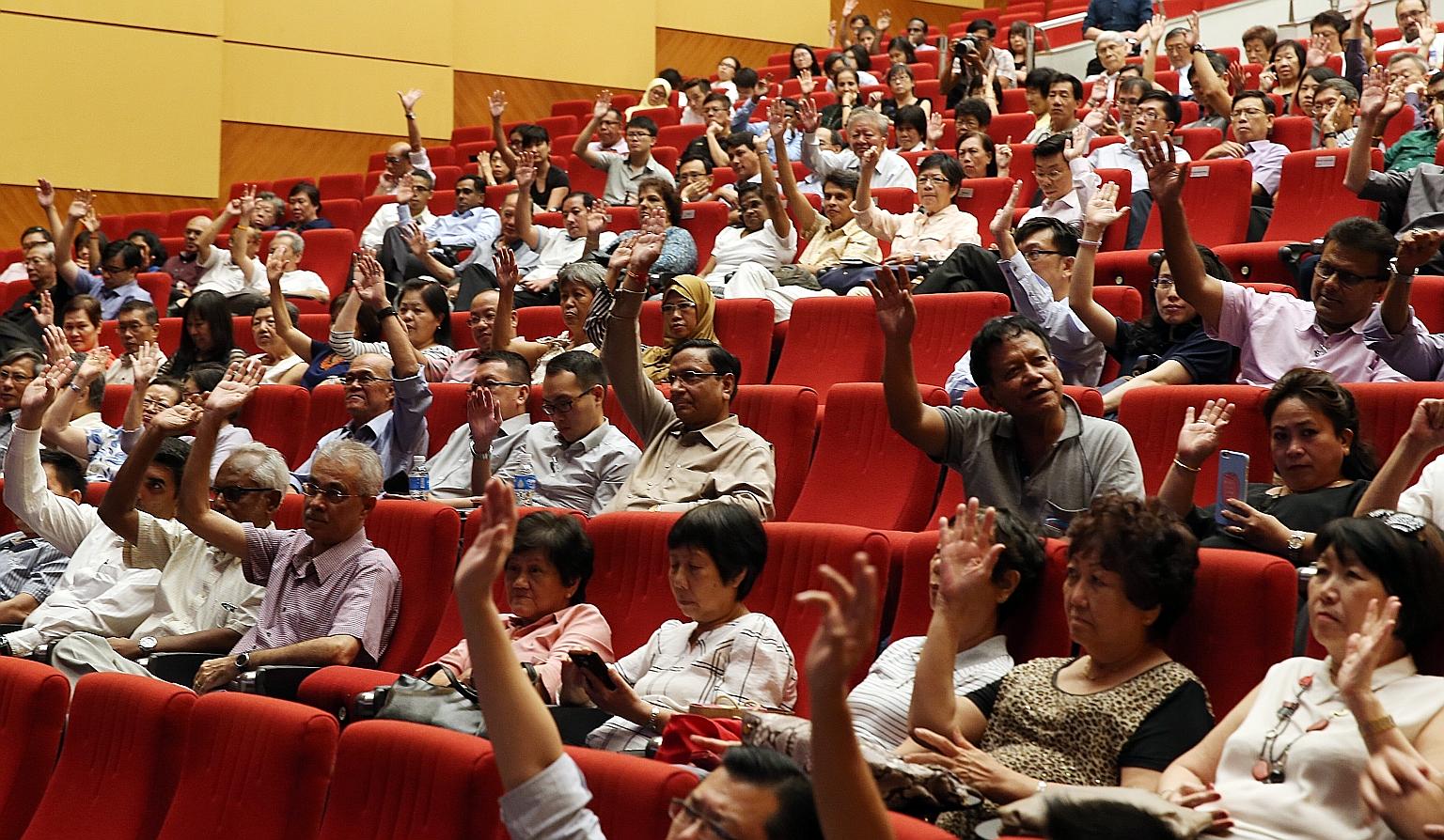White Paper on the elected presidency
Many questions raised at dialogue
Community leaders ask if changes will weaken institution, nation's principles
Sign up now: Get ST's newsletters delivered to your inbox

Community and grassroots leaders at the dialogue at ITE College East last night. During the session, Mr Shanmugam fielded questions and said the Government makes tweaks to the system that it feels are in the best interest of Singapore, even if the changes invite criticism from some quarters.
ST PHOTO: LAU FOOK KONG
Whether proposed changes to the elected presidency weaken a key institution in Singapore's political system or undermine the nation's basic principles like meritocracy - these were the thrust of many questions raised by community leaders at a two-hour dialogue yesterday.
But Law Minister K. Shanmugam said the Government makes tweaks to the system that it feels are in the best interest of Singapore and Singaporeans, even if the changes invite criticism from some quarters.
He cited the Group Representation Constituency system, which was introduced in 1988 to guarantee minority representation in Parliament.
The Government of the day faced severe criticism, especially from minority community leaders, Mr Shanmugam recalled.
"Many of the Malay and Indian MPs didn't want it. They said it is not good, people will say that we are being carried by the Chinese candidates, that we can't be elected on our own.
"But Mr Lee Kuan Yew realised that in the end, in some things like this, race becomes relevant - in a straight fight, race does matter," he said, referring to Singapore's founding Prime Minister.
But the GRC system has proved to work as it has been used honestly and in good faith, he said, in response to a question on whether trying to imbue respect and integrity in the elected presidency is an elusive process given the proposed reserved election.
"Today, some ministers are minorities: I anchor my constituency, nobody says I'm being carried by someone else," said Mr Shanmugam.
A reserved election is for a particular race which has not had an elected president for five terms or 30 years.
Last night's panel, which included Senior Minister of State (Defence and Foreign Affairs) and South East District Mayor Maliki Osman, was also asked whether the proposed changes would lead to an erosion in meritocracy.
No, said Mr Shanmugam, who noted that in the past, when the president was appointed, the office was rotated among the different races.
In the event of a reserved race, the candidates must still meet the eligibility criteria.
The panel was also asked if the proposed changes are aimed at locking out potential candidates that the Government dislikes.
Mr Shanmugam said the "key thing" is to leave aside the individual and ask whether the system needs to be evaluated regularly and kept relevant.
"Do we, as a Government, do what is right based on the system, or do we worry, well, some people are going to say, this is to knock out people we don't like?" he asked the audience of about 300 grassroots and community leaders.
The current criteria mean more than 1,000 private sector individuals qualify as candidates. It is not possible to ensure all will still qualify when the bar is raised, he added.
Asked why the Government wanted to retain the three-year, instead of six-year, qualifying tenure for private sector candidates, Mr Shanmugam said the Government felt a six-year qualifying period that falls within the last 15 years may exclude otherwise qualified individuals.
SIM University economist Walter Theseira said the Government was probably aware that overly stringent criteria will place too much emphasis on the custodial powers and have the unintended effect of excluding individuals who have the qualities to play the unifying role of the president.
Also, if only one candidate qualifies to run, it reduces the legitimacy of the elected president, he added.
Dr Norshahril Saat of the Iseas - Yusof Ishak Institute said the Government did not accept all the recommendations for raising the eligibility criteria because it wanted to strike a balance between maintaining high standards and ensuring there are enough people who qualify for the job.
"You want to ensure high standards so that the position is given to someone who can manage the technical requirements of the position, but not too much that you shrink the pool of those who qualify," he said.


